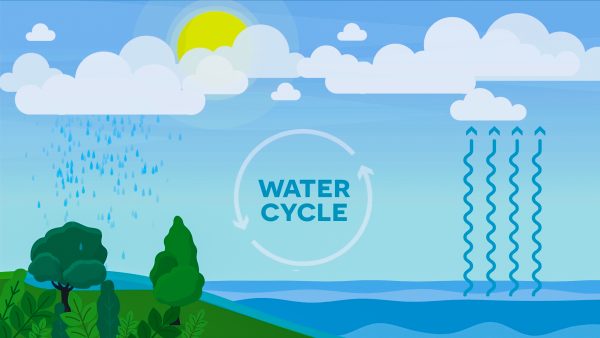Condensation Definition
Condensation is when a gas turns into a liquid. For example, water vapor in the air condenses to form clouds in the sky.
View Lesson on Water Cycle (3-5 Version)
If you are on a school computer or network, ask your tech person to whitelist these URLs:
*.wistia.com, fast.wistia.com, fast.wistia.net, embedwistia-a.akamaihd.net
Sometimes a simple refresh solves this issue. If you need further help, contact us.
Water Cycle (3-5 Version)
Fun Facts
- As a cold glass of water sits on a table, water vapor from the air condenses into water droplets on the glass.
- Dew forms close to the ground from condensed water vapor.
- Fog is formed by water vapor condensing a little above the ground.
Why Do We Need To Know About Condensation
Learning about condensation helps us see how important it is for making things like dryers and other home devices work better. It’s also important in studying the environment, weather, and even making drinks through a process called distillation.
Understanding condensation is key for jobs in many areas, including making clean water or studying how water moves in nature. Did you know clouds are made of billions of tiny water droplets? It’s important for students thinking about these kinds of jobs to know about condensation.
Frequently Asked Questions
Related Topics
- Algae Definition
- Astronomy Definition
- Balanced Force Definition
- Bioindicator Definition
- Camouflage Definition
- Cell Definition
- Chemistry Definition
- Comparative Anatomy Definition
- Condensation Definition
- Convection Definition
- Decomposer Definition
- Definition Of Evidence
- Distillation Definition
- Earth’s Rotation Definition
- Electron Definition
- Element Definition
- Environment Definition
- Evaporation Definition
- Food Chain Definition
- Fossil Record Definition
- Fresh Water Definition
- Geologic Time Scale Definition
- Greenhouse Gases Definition
- Heat Definition
- Humidity Definition
- Internal Structures Definition
- Life Cycle Definition
- Light Source Definition
- Natural Resource Definition
- Partial Eclipse Definition
- Particle Model Of Matter Definition
- Plant Definition
- Pollen Definition
- Precipitation Definition
- Predator Definition
- Reproduction Definition
- Seed Dispersal Definition
- Senses Definition
- Smelling Definition
- Symbiosis Definition
- Synthetic Materials Definition
- Tissue Definition
- Transverse Wave Definition
- Unbalanced Force Definition
- Volcano Definition
- Water Cycle Definition
- Weather Map Definition
- Weathering Definition
Select Grade
Select Subject
Skip, I will use a 3 day free trial
Enjoy your free 30 days trial

































































































































